2023. June 07.
The John von Neumann Professorship and Honorary Doctor titles also awarded at the ceremonial session of BME’s Senate.
Katalin Karikó, a Széchenyi Prize-winning biochemist and research biologist, has been awarded the title of BME’s John von Neumann Professor.
Katalin Karikó pioneered the discovery of synthetic mRNA-based vaccines for medical use. In 2020, her patented third-generation Pfizer-BioNTech Covid19 vaccine, the first in the world to be clinically proven effective, was developed. The mRNA-based vaccine technology she developed has led to promising results in the treatment of other diseases, including cancer, stroke, malaria and multiple sclerosis.
He work was deemed by the nominating committee worthy of the legacy of John von Neumann: like the computer built based on Neumann’s ideas, the mRNA COVID vaccine had an impact on humanity as a whole.
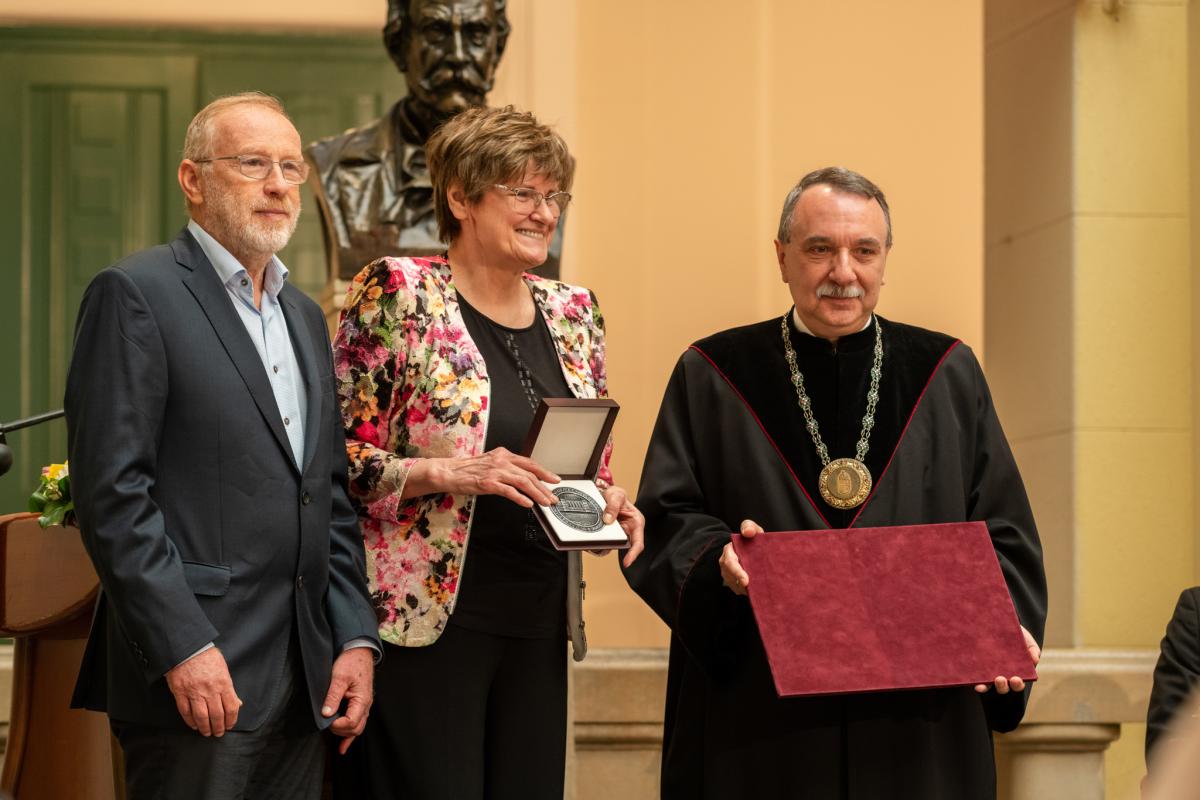
Katalin Karikó receives the diploma of the BME John von Neumann Professorship at the ceremonial meeting of the Senate
Katalin Karikó graduated in biology from József Attila University of Szeged (JATE), then obtained her PhD in biochemistry. Her thesis topic was the synthesis and application of antiviral short RNA molecules. She worked at the Biological Research Centre in Szeged, from where she was dismissed due to downsizing. She continued her research at Temple University in Philadelphia (USA), then in Washington, and from 1989 at the University of Pennsylvania (UPenn). In 2013, she became a senior executive at the German company BioNTech.
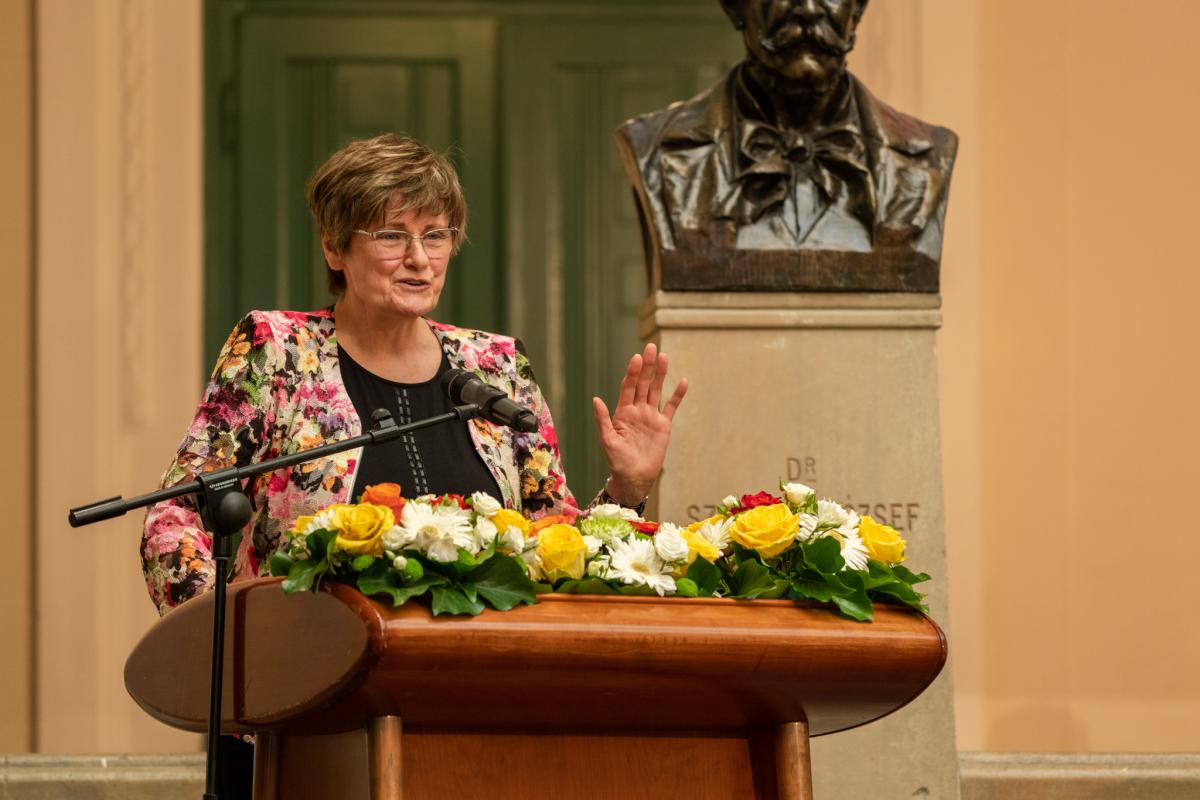
In 1997 immunologist Drew Weissman started HIV vaccine experiments, which Katalin Karikó joined as an mRNA researcher. Considering the possibilities of therapeutic use, the Hungarian researcher decided to replace uridine, one of the four building blocks of mRNA, with a modified version, pseudouridine, which is commonly found in cells. The resulting mRNA with reduced immunity has been shown to be effective in vaccines. The method, patented by the university (UPenn) and called the Kariko-Weissman technique, built heavily on her mRNA research – this is what decades later became the basis for COVID vaccine development at BioNTech and Moderna
and opened up new perspectives in several other areas in medicine.
Katalin Karikó has not only taken a globally recognised leading role in the rapid response to the COVID pandemic and in the development of the vaccine
, which has proven to be effective, but she has also been and continues to be responsive to the doubts and fears of society with great sensitivity.
Before receiving her John von Neumann Professorship, Katalin Karikó gave a lecture attracting a full house, on 2 June 2023 at BME’s Károly Simonyi Lecture Hall.
***
The Senate conferred the title of Honorary Citizen of BME on Miklós Bendzsel, President of the Hungarian Academy of Engineering (HAE). The mechanical engineer and engineer-economist was honoured for his role in educating generations of engineers, for his pioneering work in the field of intellectual property protection and for his contribution to strengthening the cohesion of the engineering community.
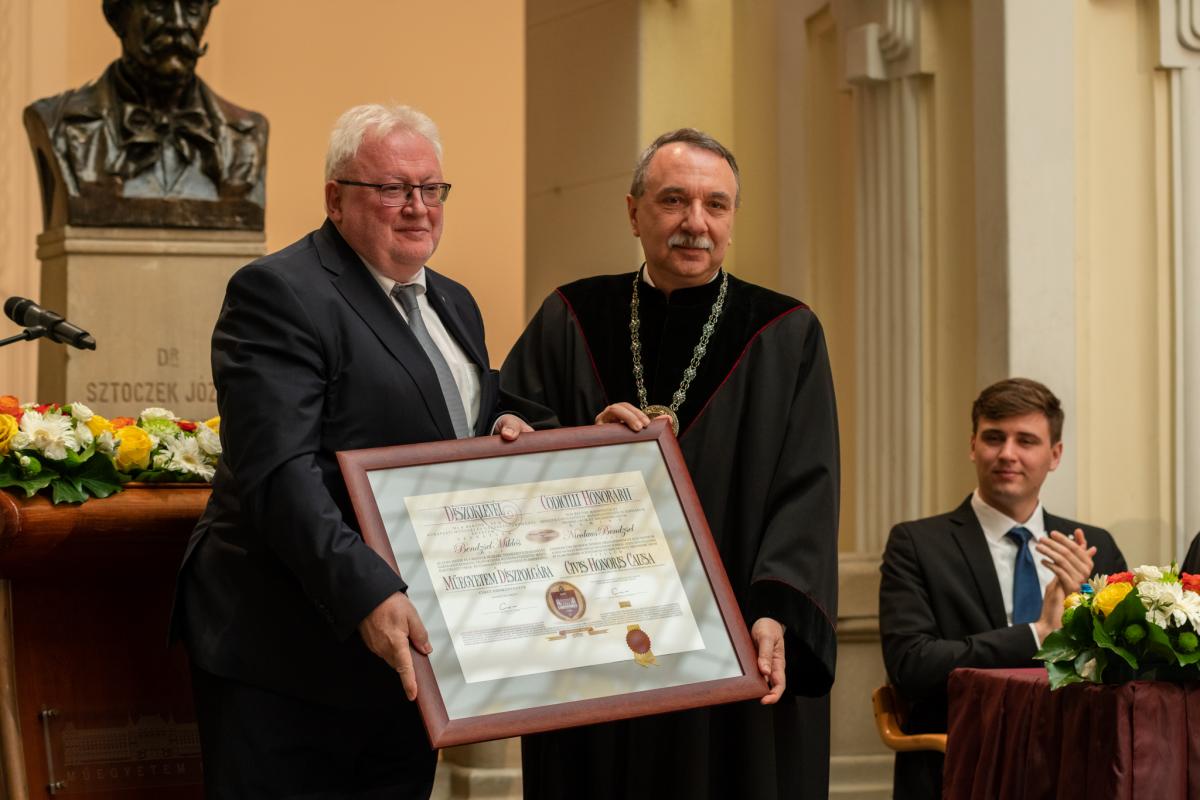
Miklós Bendzsel, Honorary Citizen of BME and Tibor Czigány, Rector, at the ceremonial Senate meeting - Miklós Bendzsel presented the 1890 charter of the Society of Hungarian Engineers and Architects to the University's historical collection, which solemnly inducted János Csonka, who had been the head of the University's Workshop for a decade and a half, into its membership
Miklós Bendzsel's career has been intertwined with the University of Technology from a young age: he graduated as a mechanical engineer at BME’s Faculty of Mechanical Engineering, later on he obtained a degree in engineering and economics at the Corvinus University of Budapest (formerly known as Marx Károly University of Economics) before obtaining a doctorate in economics. After working as a research engineer for some years at the Institute for Mechanical Engineering Technology, he gained nearly 30 years of experience in the field of industrial property protection. He has held various roles at the Hungarian Intellectual Property Office, including Secretary to the President, Executive Vice President and President. He was first Vice President and from 2020 President of the Hungarian Academy of Engineering (HAE).

Miklós Bendzsel is a member and officer of several professional organisations and an elected member and officer of several public administration and state bodies. He has been the Chairman of the Board of Trustees of the Gábor Dénes Prize from 2019.
He is a regular guest lecturer at Hungarian universities specialising in engineering and business. He was nominated for the title of Honorary Citizen of BME by the Faculty of Mechanical Engineering (BME GPK).
***
Muriel Médard, an internationally renowned lecturer-researcher at the Massachusetts Institute of Technology (MIT) and a recognised authority on communication technologies, has been awarded an Honorary Doctorate of BME..

Muriel Médard is conducting key research in the field of network coding. Together with her colleagues, she achieved fundamental results that represented a breakthrough not only in theoretical terms, but also in the practical application of the technology.
In the early 2000s, network coding seemed like a promising technology, but its computational complexity was too great to imagine integrating it into practical, distributed systems. This is where the work of Professor Médard, her group and colleagues on random network coding has made a difference. They have developed the technology required to put network
coding into practice; their results have enabled the successful application of network coding even without the knowledge of network structure or global information.
Her work as a researcher also had a major impact on network coding security. She has achieved seminal results in areas such as unencrypted pollution detection, the first homomorphic network coding scheme based on simple Diffie-Hellman principles, network coding routing, implicit codes, encryption based on encryption-only coding coefficients, watchdog schemes for wireless networks, and reliable storage on untrusted networks.
Her work was the first to explore the information-theoretic foundations of network management. Network management is a rich and varied field that so far has been studied in an ad-hoc, application-specific way. Instead, Professor Médard and her team used analytical methods to investigate the issues regarding the network management of troubleshooting.
Her work on distributed random network coding has not only produced fundamental theoretical results, but also led to a remarkable technology transfer.
The impact of her outstanding professional achievements is reflected in the fact that she is ranked in the top 1% of researchers in the world in terms of citations. She was named one of the world's most influential scientific minds by Thomson Reuters in 2014. Muriel Médard and her research group have been collaborating with the Faculty of Electrical Engineering and Informatics (VIK) of BME for many years, which is reflected in joint projects, publications, seminar lectures and visits. These have greatly shaped research activities at the faculty and strengthened BME’s international embeddedness in the field.
***
The Honorary Doctorate of BME title was also awarded to Károly Tóth (Charles Tóth), research professor at the Department of Civil Environmental and Geodetic Engineering at Ohio State University (OSU) since 2013.
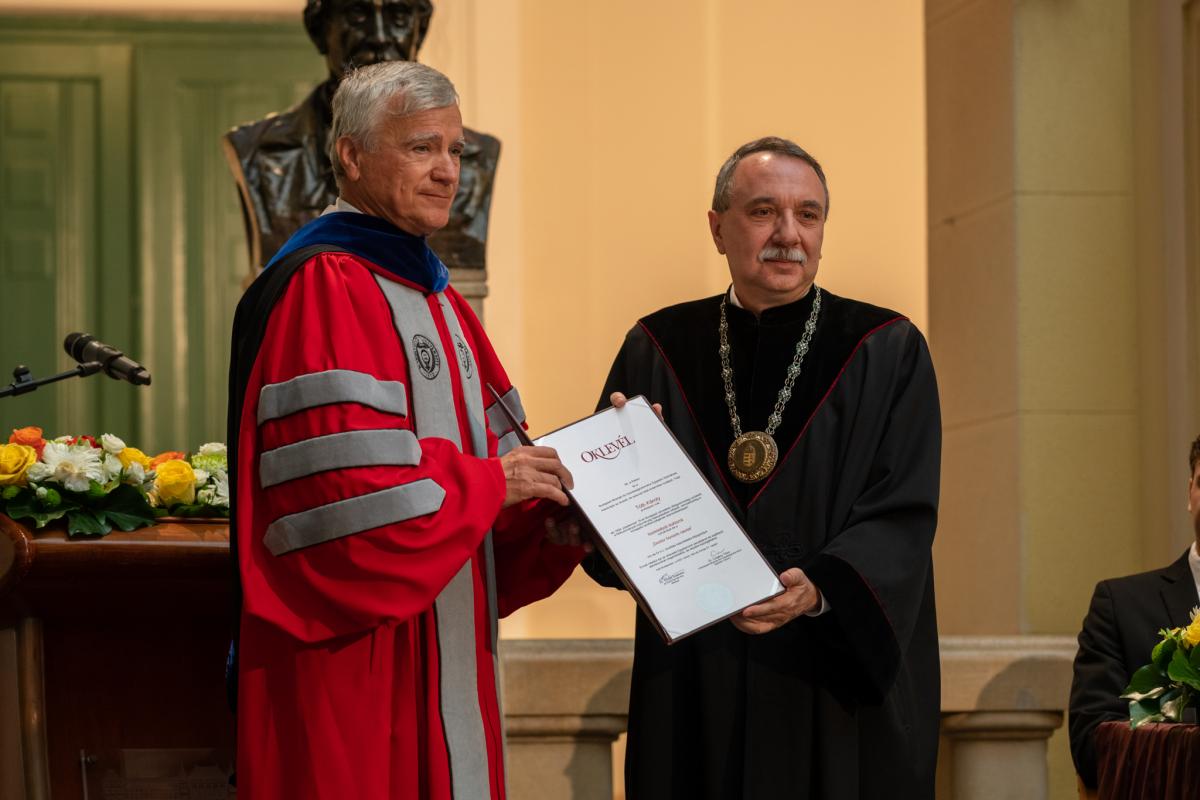
Born in Hungary, he is an internationally recognised expert in the fields of photogrammetry, remote sensing, geomatics, sensors, navigation and mobile mapping technologies. Early in his career, he played a key role in developing and implementing the concept of the first mobile mapping system (MMS), one of the first civilian applications of GPS. He is considered one of the founding fathers of MMS and is recognised worldwide for his contribution to the development of MMS technology and applications. For the past 25 years, he was one of three international leaders who organised the International Symposium on Mobile Mapping Technology (MMT), which focuses on the development of navigation and imaging technologies and their applications in digital mapping, urban modelling, emergency response, unmanned vehicles, precision farming, personal navigation, indoor navigation, etc.
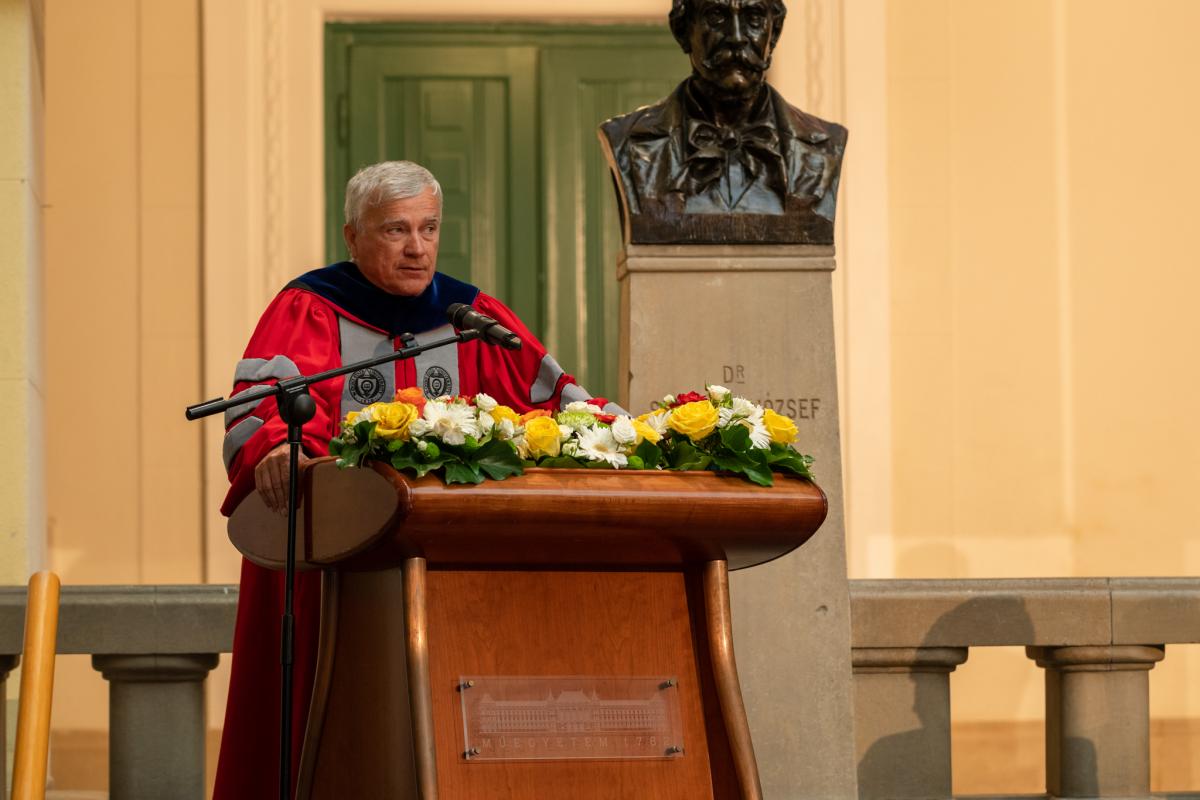
In the late 1990s, he led the OSU team on the Airborne Integrated Mapping System (AIMS) project, which was the first in the world to deliver a prototype of a fully digital, directly georeferenced, high accuracy airborne mapping system, based on the close integration of GPS and the Inertial Navigation Unit (IMU). Later he has made significant research contributions to direct georeferencing of remote sensing platforms, introducing GPS/IMU-based sensor orientation to the mapping community, and is generally credited with coining the terms “direct and indirect georeferencing”.
He was an early advocate of the use of complex geospatial data (such as terrain models and images) to support vehicle navigation. His efforts in this area have contributed greatly to the rapid development of autonomous vehicle technologies.
He has designed and developed several prototype systems for research in the field of mapping and navigation, including various backpack navigation and mapping systems to support combat and emergency units; mobile platforms supporting indoor navigation and mapping, and the development of collaborative navigation. He has led a number of field measurements and studies to evaluate the performance of prototype systems in collaboration with other research groups.
In the past three decades, he has developed a close and successful cooperation with the Faculty of Civil Engineering at BME, in particular with the Department of Photogrammetry and Geoinformatics and the Department of Geodesy and Surveying. 10 faculty members and doctoral students have spent at least 6 months of their research at OSU under his leadership.
***
Gyula Vancsó, Professor at the Department of Chemistry at the University of Twente (Netherlands), an internationally renowned authority on the design of properties of functional nanostructured materials and the study of nanoscale morphological structures, was awarded the BME’s Honorary Doctorate title.
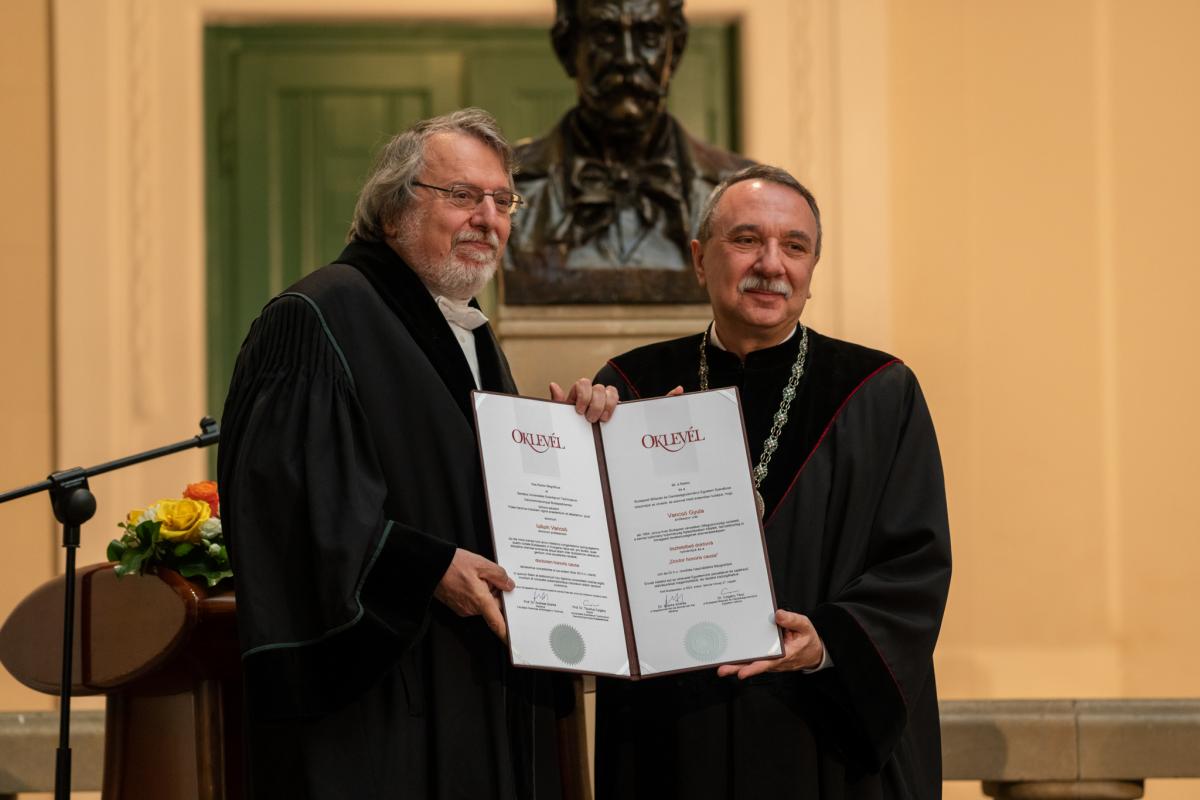
Gyula Vancsó has been collaborating intensively with BME’s Faculty of Chemical Technology and Biotechnology (BME VBK) and the Hungarian scientific community since obtaining his PhD.
His research interests focus on macromolecular nanotechnology, materials science and soft materials, with a special interest in the design of nanoscale textured surfaces, molecular chemistry and physics, atomic force microscopy (AFM) and organometallic polymers. He has also carried out intensive research in the field of surface characterisation of biological systems, as well as the study of the interface of biopolymers, synthetic polymers and seawater. Many of his papers have been published in leading journals in materials science.
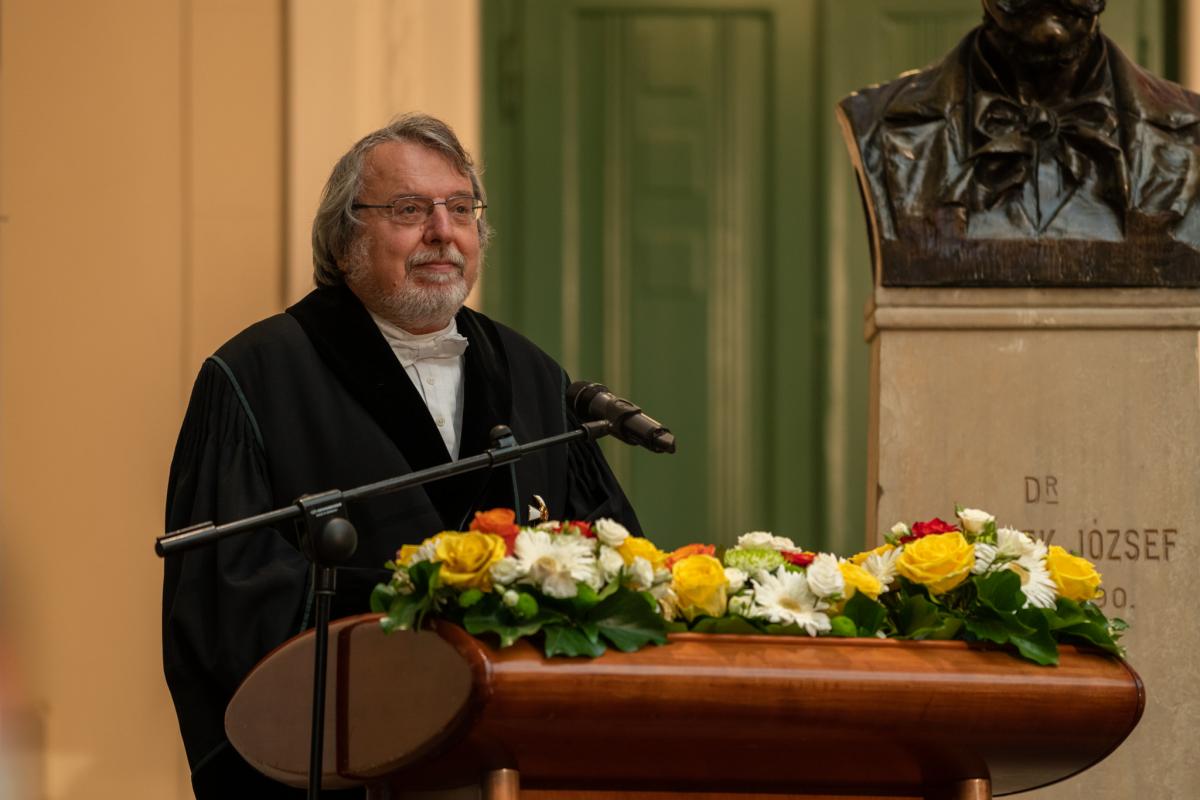
He collaborated at BME with the former Department of Plastics and Rubber Technology over several decades, mostly in polymer chemistry and polymer physics. The relationship is still ongoing and one of the young lecturers of the now restructured Laboratory of Plastics and Rubber Technology is now working in Gyula Vancsó’s team in Twente. Our cooperation has resulted in a total of 8 publications, which have been published in top journals in the field of materials science.
In addition to his research achievements, he is actively relying on his outstanding organisational skills, and as a result he has implemented several major projects and consortia collaborations, always trying to involve Hungarian research groups. He was a member of the Scientific Advisory Board of the HAS Research Centre for Natural Sciences (MTA TTK).
***
The title of BME’s Honorary Doctor was awarded to Alon Wolf, Professor, Director of the Biorobotics and Biomechanics Lab, former Vice-Rector, current Dean at Technion - Israel Institute of Technology, and the head of the Israeli Olympic Sports Research Centre, a Technion collaboration with Israel’s Olympic Committee.
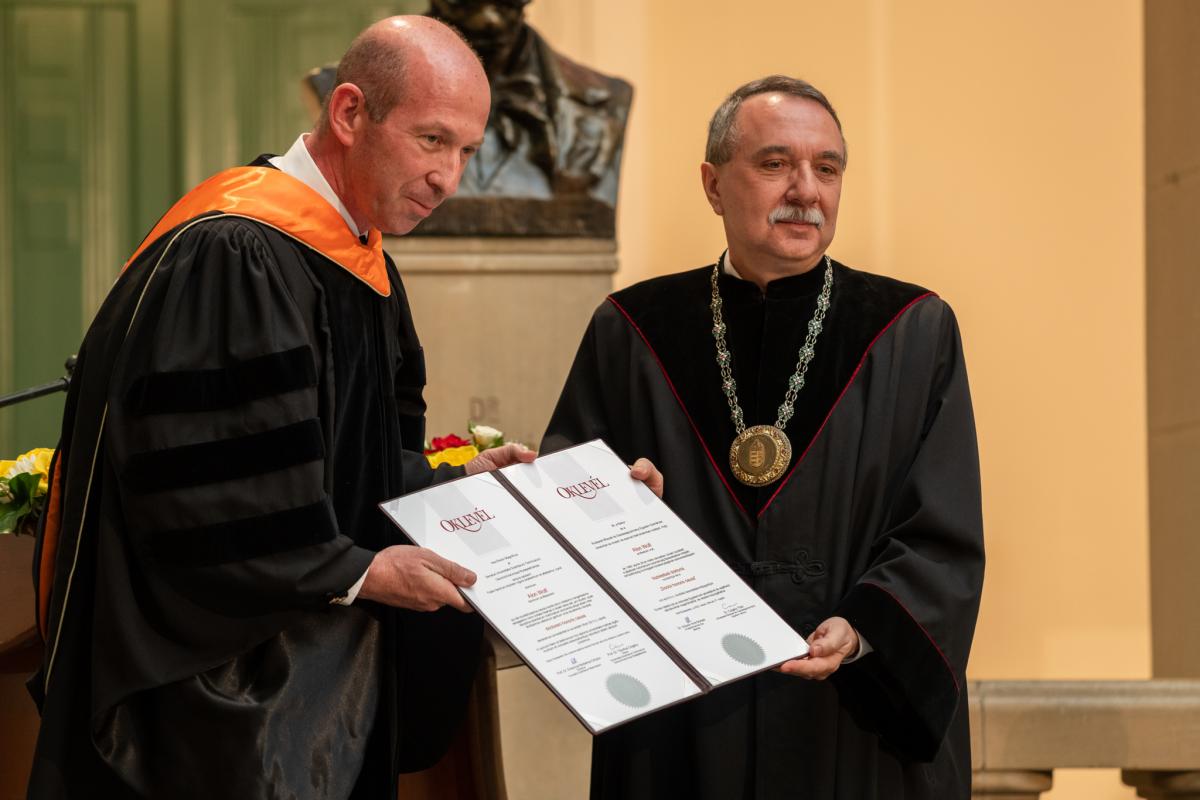
Alon Wolf has made outstanding contributions to the fields of biomechanics and biorobotics. Through his scientific work, the professor has been instrumental in restoring the lives of countless people through the development of medical and surgical technologies, particularly robotic prosthetic hands for children in need.
As part of his teaching and research activities, he has also been active in establishing and developing educational and scientific links between BME and Technion.
His studies and research are mainly related to medical image processing, biorobotics and practical applications of motion analysis. At Technion, he founded the Biorobotics and Biomechanics Laboratory (BRML). BRML aims to pursue research and development that has tangible impacts in real life through the use of biomechanics and biorobotics. The lab gives many MSc and PhD students an opportunity to further their studies and research.
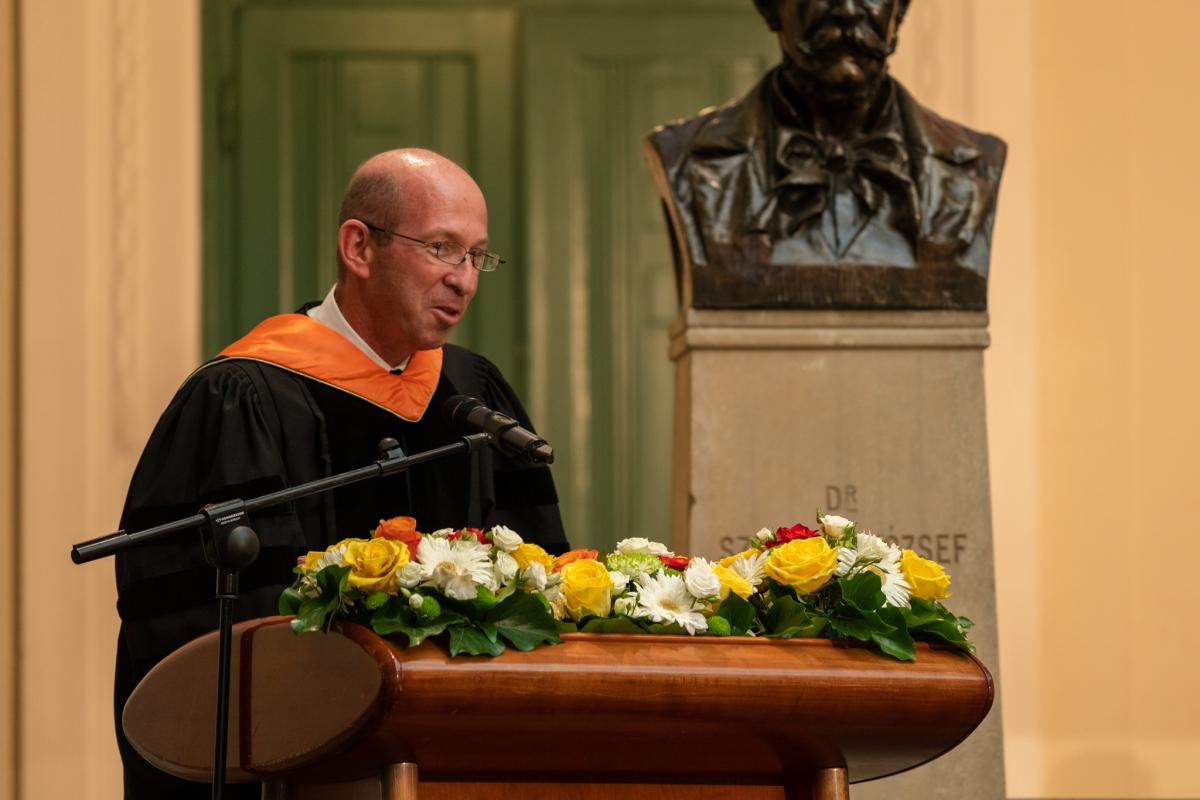
He has won numerous research awards: in 2012, his urban explorer-rescuer snake robot and in 2014, his surgical snake robot were named one of the IEEEE's Distinguished Innovations, and in 2016/17 he was named Best Presenter of the IEEE Engineering in Medicine & Biology Society. Recently, an important area of his research has been the development of robotic orthoses.
He has had an active professional relationship with BME’s Faculty of Mechanical Engineering (BME GPK) since the early 2000s. Alon Wolf's research group and BME GPK’s Research Centre for Cooperation on Biomechanics conducted the verification of different motion testing methods in parallel, but independently, then researchers in Israel investigated the effect of lower limb joint problems on gait. Alon Wolf's professional advice helped to establish the MoCap Laboratory of BME GPK’s Department of Mechatronics, Optics and Mechanical Engineering Informatics (MOGI). He is a regular PhD thesis referee and an invited lecturer in the biomechatronics specialisation within the mechatronical engineering programme. As Vice-Rector, he helped to build professional links between BME and Technion. This has resulted in the Erasmus+ KA 107 project, which has enabled a number of student and staff visits.
TZS-KJ
Photos: Viktor Kiss


